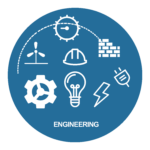About
The Electrical, Sensing, & Communication Engineering research area focuses on the following topics:
– Smart sensor-based monitoring: Utilizing intelligent sensors to continuously collect and analyze data from various sources for real-time insights and decision-making.
– Fault diagnosis and self-healing: Identifying abnormalities or malfunctions within a system and implementing automated processes to rectify these issues without human intervention.
– Estimation and identification of unpredictable signals: Employing statistical methods and machine learning algorithms to forecast and recognize unexpected patterns or signals within data sets.
– Advanced measurement & instrumentation techniques: Utilizing cutting-edge tools and methodologies to accurately quantify and analyze physical parameters, enabling precise measurement and characterization of complex systems.
Several DoE research groups collaborate on this area with wide-ranging projects including:
In the project Eco-city “Hollerich Village” we developed an energy management system for residences in eco-cities using certainty equivalent economic model predictive control to optimally operate the building energy system with respect to varying electricity prices. The proposed framework is a comprehensive mixed integer linear programming (MILP) model that uses suitable linearized gray box models and purely data-driven model approaches to describe the system dynamics.
The stability and quality of the electric power are the key factors for a good electricity supply service. The proposed inverter system (Active Power Support for Smart Grids) controls, very accurately, the active and reactive power flow exchanged between grid and power units fed by renewable energy source. In addition to that, the smart inverter uses the full potential of power electronics as it embeds the ability to mitigate the harmonics that could appear on the grid. The developed solution transforms every decentralized energy production unit into a very flexible and autonomous power unit.
The project High Power Drives for Heavy-duty Vehicles aims at electrifying the transmission & traction system of heavy-duty vehicles on construction sites as well as agricultural tractors for CO2 emission reduction compared to the conventional fossil fuels based thermal engines. The cost-efficient and compact in size new architecture takes into consideration the particular load profiles of these vehicles like high torque at low-speed and inexistent regenerative braking energy recovery. The benefits are reduced air and noise pollution, higher energy efficiency, and increased productivity.
The goal of the project Overheating and Heat Stress – Mitigation and Adaptation Strategies is to use comfort monitoring sensors and mobile data processing apps to promote adaptation to the climate change and disaster prevention. Ecosystem-based approaches, like sustainable construction, more efficient operation of technical equipment, education & training of professionals, are considered as well, to increase the resilience to the environmental conditions through targeted monitoring, warnings, as well as countermeasures and, that way, to protect vulnerable people during heat waves highly more frequent with the time being.
The Advanced Engineering & Smart Sensors Solutions lab, headed by the Professor Inès Chihi, provides creative, high-level research through careful selection of the scientific issues investigated and the invention of new approaches.
The research undertaken is original through its methodological and applied character. The team focuses on solving scientific and complex problems related to smart-sensor-based monitoring, modelling, and identification of complex systems with unpredictable behaviours. Investigations are mainly applied to biomedical, energy, and smart industries.





